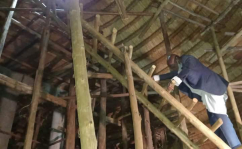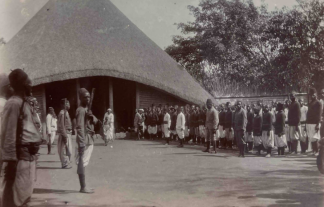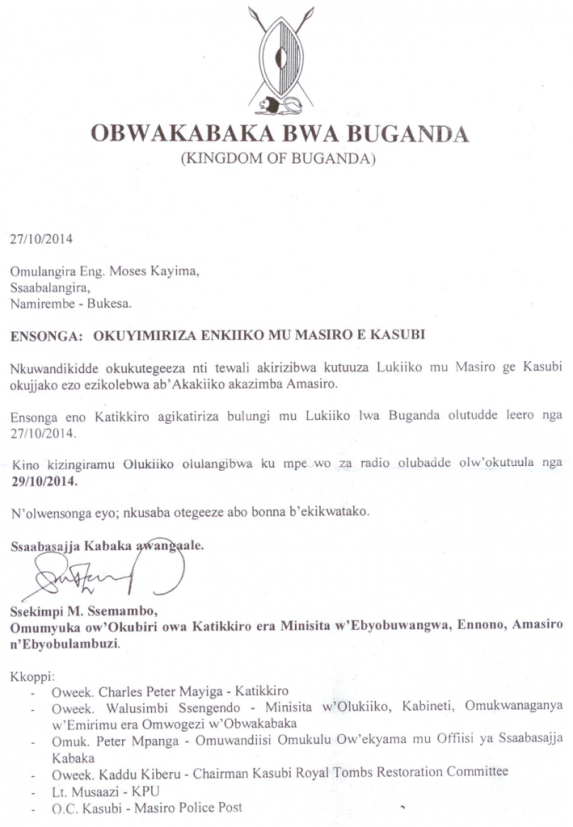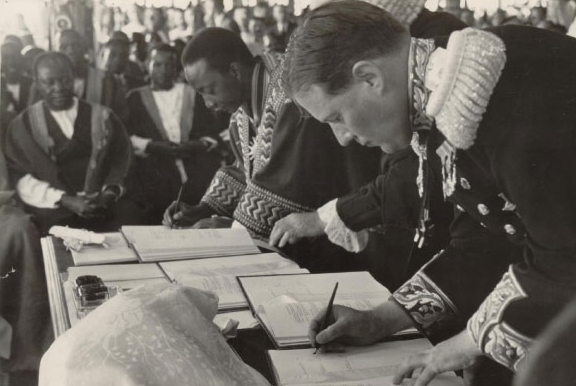The list of the issues to be addressed that Mr Mayiga puts out, of course, is not new, except that there is some freshness to the way he puts them across. But perhaps more importantly at the moment, Mr Mayiga tackles Mr Museveni’s governance record with a boldness that he has not exhibited during the years he has been katikkiro.
Mr Mayiga was appointed katikkiro in May 2013 and has less than six months to run on his four year term, which is renewable. He replaced Mr John Baptist Walusimbi, who was himself appointed to the kingdom’s topmost administrative position in a clear attempt to de-escalate tensions between Buganda Kingdom and President Museveni’s government.
Before Mr Walusimbi’s appointment, relations between the kingdom and the government were very bad. Mr Daniel Muliika, Mr Walusimbi’s predecessor, had openly backed Dr Kizza Besigye’s shot at the presidency in 2006 and his sacking after just a year in office and replacement by Mr Walusimbi, which was openly opposed by some Buganda loyalists, signalled a change of approach by Kabaka Mutebi.
Mr Walusimbi is an engineer and his firm had participated in the lucrative refurbishment of State House Entebbe, which made kingdom loyalists to associate him with Mr Museveni. On taking office, Mr Walusimbi approached his tasks in a heavily depoliticised manner and seemed to move to repair relations with the government. At some point he picked some Shs1.2b from the central government for the kingdom to assist in promoting agriculture.
But even then, Mr Walusimbi’s team was stuffed with radical players, including the influential Mr Mayiga himself, who was the kingdom spokesperson and minister for cabinet affairs.
As the fallout between the government and the kingdom over land escalated, Mr Mayiga and two other kingdom officials were picked up by State functionaries and detained in different places in western Uganda for more than a week.
The other officials were Mr Medard Lubega Sseggona, who then deputised Mr Mayiga as kingdom spokesperson, and Ms Beti Nambooze, who the Kabaka had appointed to chair a sensitisation committee on land matters. Mr Sseggona and Ms Nambooze would later be elected to Parliament.
Given his firebrand character during his long service to the kingdom, Mr Mayiga was expected to continue the hardline stance when he took over as katikkiro. But he moved to further de-escalate the tensions between Mengo and the central government the moment he took over from Mr Walusimbi.
Within three months of Mr Mayiga’s appointment as katikkiro, a memorandum of understanding (MoU) was signed between President Museveni and Kabaka Mutebi at State House Entebbe.
In the MoU, the central government accepted to restore to the kingdom a number of its assets which were confiscated after the 1966 invasion by government forces of the palace of King Edward Muteesa, Mr Mutebi’s father. Muteesa fled to exile in London, from where he would die in 1969. The kingdom was abolished after the attack, only to be restored in 1993 under Mr Museveni.
But Mr Museveni and the kingdom quarrelled almost immediately after the restoration.
In the new book, Mr Mayiga says the fallout “started with the promulgation of the 1995 Constitution, which did not cater for much of Buganda’s proposals”. The new Constitution, Mr Mayiga writes, “ was expected to heal the wounds of the 1966 Crisis and resolve the Buganda Question,” an aspect to which he commits a full chapter in the book.
Change of direction?
Mr Mayiga had been a protagonist in the fallout and on being appointed katikkiro he restated the five key demands that Buganda has – the first one being respect for the king – but he clearly moved to change approach.
Before he assumed the position, ruling party members were not welcome at Buganda functions, especially those that took place in Lubiri at Mengo. Insults and objects would be hurled at those that dared to attend.
Mr Mayiga changed this by having President Museveni attend Kabaka Mutebi’s 20th coronation anniversary in Lubiri Mengo in July 2013. At the function, of course with the Kabaka in attendance, attendees tried to boo the President in protest against his presence, but Mr Mayiga warned them against the act.
He reminded them about the supremacy of the will of the kabaka in Buganda, saying it is the kabaka who had invited the President and disrespecting the kabaka’s guest amounted to disrespecting the kabaka himself. The hecklers went quiet. This was just days after the said MoU had been signed and land titles returned to the kingdom.
Mr Museveni said while ending his speech at the function: “Finally, I congratulate Your Highness, the Kabaka, on the Memorandum of Understanding you signed with me the other day. That MoU deals with the issues some people who like to recklessly fish in troubled waters have been using regarding some issues including the former masaza-magombolola estates as well as the harmonisation of the rights of the indigenous cultural groups in Buganda.”
In a further indication of the warming of relations between the two centres of power, Mr Museveni sent Vice President Edward Ssekandi to Kabaka Mutebi’s 60th birthday with a nice present – a posh car.
Opposition politicians, many of whom had viewed Mengo as an ally in the fight against Mr Museveni, were most dejected. Some of them openly spoke out against Mr Mayiga, who they accused of selling out to Mr Museveni.
Ms Nambooze and FDC spokesperson Ssemujju Nganda, two radical Baganda politicians who had made the kingdom radio station, CBS, their base, went off the station’s talk shows.
In the meantime, Mr Mayiga waged the biggest social fundraising drive to happen in the country in many years, raising billions to rebuild the burial site for Buganda’s kings, Kasubi Tombs, and complete a commercial building near Bulange, the seat of Buganda Kingdom.
He preached hard work and a renewal of faith in people’s abilities on his visits across the kingdom, and on many cases conducted fundraising and mobilisation drives in other parts of Uganda and abroad.
To many, Mr Mayiga seemed bent on recreating Buganda as an economic and not necessarily a political empire.
Change of direction?
For those who looked at Mr Mayiga’s intentions in that way, Uganda: 7-Key Transformation Idea will have come as a surprise.
Apart from offering ideas which Mr Mayiga thinks would help in the transformation of the country, he challenges some of the views Mr Museveni has espoused in the past and punches holes in the story of “steady transformation” during Mr Museveni’s time.
Over the years, for instance, Mr Museveni has placed the blame for Africa’s failure to defend itself against colonialism at the feet of the pre-colonial rulers like Buganda’s Muteesa I and Mwanga II.
At the height of the disagreement between Mr Museveni and Kabaka Mutebi in September 2009, when more than 30 people were shot dead in Kampala and other Buganda townships as people protested the government’s blocking of the Kabaka’s visit to Kayunga, Mr Museveni addressed Parliament.
“We are totally against the kings being involved in politics. The kings failed to defend the sovereignty of Africa. That is why we were colonised. The colonisation of Africa was a vote-of-no-confidence in tribalism and the pre-colonial kings. Africa failed to defend herself because of tribalism and tribal political organisation. Modern Africa must transcend and discard tribal organisation,” Mr Museveni told Parliament.
In the introduction to the book, Mr Mayiga writes: “I believe I understand why Africa is backward. But my major interest is in getting solutions. I see little value in dwelling on slave trade, or the failure of the then leaders to beat off colonialists when they first came in the 19th Century. In any case, slave trade and colonialism triumphed because the aggressors came with superior technology.”
Mr Museveni has penned numerous treatises attempting to explain the genesis of Africa’s troubles, and slave trade, colonialism and neo-colonialism feature prominently in his writings.
Mr Mayiga says whereas describing the problem is important, getting the prescription right and implementing them in the right way is what will get Africa out of its problems.
Mr Mayiga writes: “Now we can start off on why Africa lagged behind in technological innovation despite being the cradle of civilisation. Such arguments are long, but we don’t have that much time; instead we ought to concentrate on flushing out poverty.”
The arguments about direction aside, Mr Mayiga takes issue with much of what has been under Mr Museveni’s government, including the building of roads, which Mr Museveni has in the recent past presented as one of his biggest achievements.
Mr Mayiga writes: “And I see the roads under construction – I, actually, regularly use the ones whose reconstruction or repaving (very few are brand new … most are merely being maintained or improved upon) has been completed. Between the major towns, the ride is in fact generally smooth, never mind that the roads are single lane. Ideally roads should be at least double lane - for safety and ease of traffic.”
When people are in danger, Mr Mayiga writes, the police will have no means of transport or equipment to respond in time, and when they go to the courts their cases will not be resolved years on end. He dots the 456-page book with examples, many drawn from his experience.
In the end, as we stated at the outset, it would appear to the reader that very little works in Uganda.
And, for those who followed Mr Mayiga before he became katikkiro, would not be surprising. The only surprising element is that he chooses to release the book at this time, only six months before the expiry of his first tenure as katikkiro, a job he has done while taking care to keep off national politics.
Could Mr Mayiga be signalling that he will serve only one term as katikkiro, especially given that Kabaka Mutebi, through his actions and appointments, has in the recent indicated that he wants no more trouble with President Museveni?
It is hard to attempt an answer to this question.














Make A Comment
Comments (3)
1) They have sold off land
2) Kingdom Affairs are handled together with other clans and in some ancestral sites for other clan the royals have joint tasks but have not bothered to follow up this matter to the extend that squatters have taken almost everything
3) Many peg-servants (abasiige) from other clans are not yet restored, is this a responsibility of Mayiga
4) Many imposter-clan leaders (nsowole) are serving while the rightful are in the cold. If they are actually right in their claim, have they advised the kabaka to that effect, despite having had this problem before 1900?
5) Linking Mayiga to Bisiyaga is shameful unless they are claiming that he practices with them, otherwise is the Katikkiro supposed to talk about everything? Did they seek his opinion in this regard?
6) Look at the enefficiencies in Kisekwa's court, is Katikkiro responsible
7) They blame him for joint officialization with nabagereka, then if asked to perform that task and abstain they will be the ones to say anyoma nnyaffe
8) Why didnt they write to Kabaka through Sabalangira and explain (indoor) other than ashaming the Kingdom by these malicious utterances.
9) Does Katikkiro Mayiga construct ebiyitirirwa, fix banana plants and drum for him self or people do it for him and if they do it voulntarily, should he run away
I am not saying that Mayega is mr. Clean but many people in Mengo establishment are wanting! otherwise;
a) How comes that the princesses and princes are so indiscipline and naive to the extent that they do not know when and from where to blame such important persons as katikkiro
b) Ensowole ekudde ejjembe mubuganda and some royals have advised kabaka to keep the status quo and purportedly done so simply because the would be affected persons are friends.
c) The Kingdom wastes a lot of money on ceremonies over 100M per function yet of such money was for instance used as a fund to lend to farmers without interest, may people should have benefited.
Abdu Muwakanya
muwats@yahoo.com
Nze Lwanga Eddy
eddy.lwanga73@gmail.com